The Hidden Powerhouse of Your Tech Stack: Elite IT Support Technicians
While everyone else chases the latest AI or software tool, the savviest companies are quietly prioritizing the real engine of operational success: elite IT Support Technicians. They are not just fixing computers, they have the ability to maximize uptime, minimize vulnerabilities, and directly impact your bottom line.
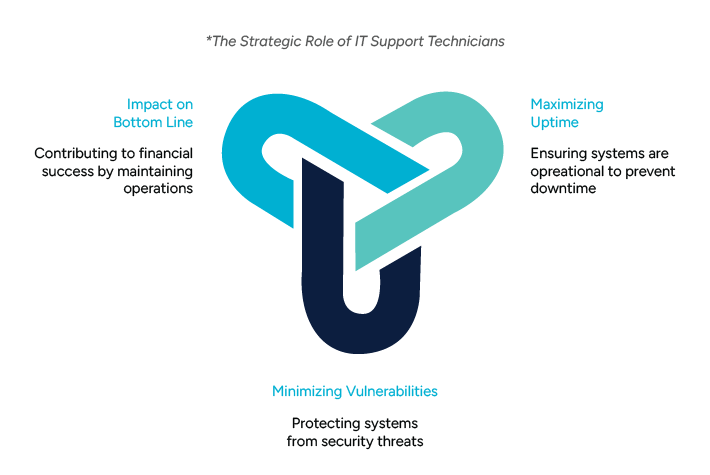
The companies that “get it” know a simple but profound truth:
You can have all the cutting-edge software in the world, but if your systems go down, your revenue goes down with them.
Your IT Challenges
Right now, you might be feeling the pressure:
Add to this the challenge of ensuring seamless collaboration across different regions, devices, and platforms. When issues arise, the right IT Support Technician is your lifeline—solving problems before they escalate and preserving both revenue and reputation.
Trends Redefining IT Support
Companies that stay ahead of the curve share a common trait: they adapt to critical IT trends before they become emergencies.
1. Proactive Issue Detection
Elite technicians leverage monitoring tools and data analytics to fix problems before they impact users.
2. Holistic Infrastructure Management
Modern IT support is about ecosystem thinking—understanding networks, software, and hardware as interconnected parts of a revenue-generating machine.
3. Cybersecurity Integration
IT support techs are now key players in security protocols, ensuring compliance and protecting sensitive data from evolving threats.
4. Cloud and Remote Workforce Optimization
From VPN setups to cloud orchestration, skilled technicians enable smooth operations for globally dispersed teams.
5. Automated & AI-Enhanced Troubleshooting
Techs who partner with AI-driven tools solve more problems, faster—freeing them to tackle strategic initiatives.
IT Support Technician vs. Developer: Who Do You Really Need?
Let’s clear the confusion. Both are crucial, but they serve very different needs.
IT Support Technician: Your Uptime Champions
Core Focus:
Maintaining system stability and user productivity.
Deliverables:
Troubleshooting issues, managing networks, securing endpoints, ensuring business continuity.
Metrics:
System uptime, ticket resolution speed, user satisfaction, cost savings.
Style:
Proactive, solutions-oriented, security-conscious.
Software Developer: Your Innovators
Core Focus:
Building new features, products, and applications.
Deliverables:
Writing code, creating custom software, iterating on product updates.
Metrics:
Feature completion, code quality, release velocity.
Style:
Creative, iterative, innovation-driven.
Reality Check: You often need both. But if your day-to-day revenue hinges on system reliability, IT support is non-negotiable. Without them, even the best product can stall if users can’t access it.
The Elite IT Support Technician Challenge
Market Realities
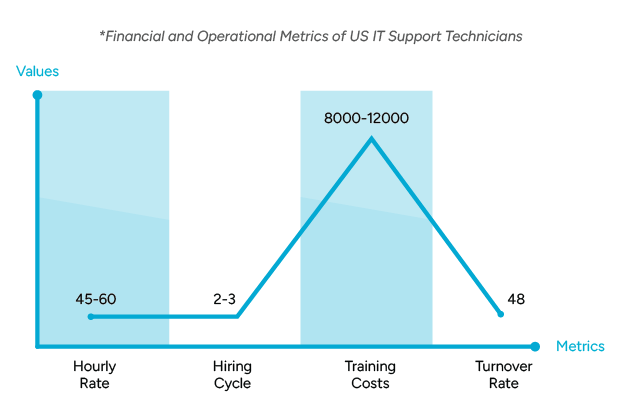
Skill Gap Crisis
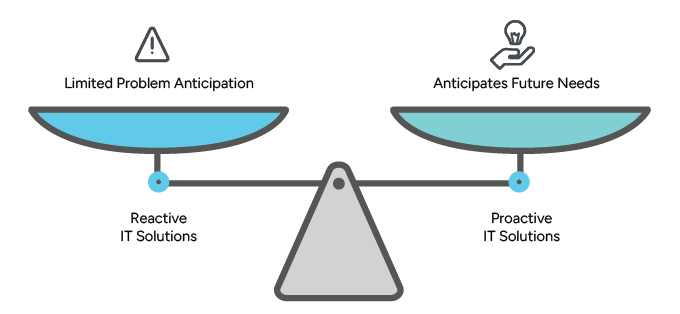
While businesses increasingly adopt advanced cloud infrastructures, a significant skills gap persists. According to Flexera’s State of the Cloud Report, the lack of expertise in managing multi-cloud environments remains a top challenge. This highlights that professionals with a combined mastery of hardware and advanced cloud security are exceedingly rare, leaving many organizations vulnerable to inefficiencies and risks.
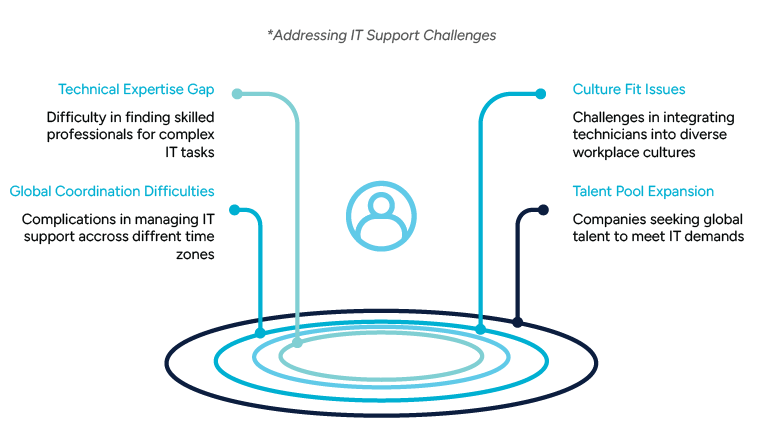
Many businesses also underestimate the cultural fit and soft skills required for an IT Support Technician to be truly effective. Simply having technical certifications isn’t enough if they can’t collaborate with different departments or explain complex issues in plain language.
This gap becomes especially challenging in global or hybrid workplaces, where technicians must coordinate with teams spread across different time zones and tech ecosystems. A missed communication here or a delayed response there can result in costly downtime—affecting everything from sales demos to customer service responsiveness.
This is exactly why forward-thinking companies are casting a wider net, often across global talent pools, to find technicians who can handle the full scope of modern IT demands.
How We Find Your Perfect IT Support Technician
What We Look For
Beyond technical certifications (yes, they need rock-solid foundations and real-world experience), we screen for:
Why Choose Us:
1. Proactive Mindset
Do they catch vulnerabilities before they become crises? Can they plan infrastructure upgrades to avoid future bottlenecks?
2. Security-First Approach
Trained in cybersecurity best practices? Able to handle compliance and data protection regulations?
3. Systems Thinking
Comfortable with both on-prem and cloud environments? Skilled in orchestrating seamless integrations among disparate tools?
4. Communication Excellence
Can they translate tech jargon into actionable steps for non-technical stakeholders? Do they remain calm under pressure and guide teams effectively?
5. Continuous Learning
Are they committed to staying updated on new platforms, security patches, and IT frameworks? Do they geek out on emerging trends like AI-augmented support?
Your Ideal IT Support Technician Profile
A person in a casual polo shirt meticulously checking server metrics at a desk, with a colleague asking for help in the background.

When you partner with us, you get a technician who:
Future-Proofing Your Tech Infrastructure
Your systems are only as strong as the people who keep them running. While others scramble to automate everything, the smart move is pairing the best tools with the best human expertise.
- Cyber threats? They evolve daily. You need someone who’s always one step ahead.
- AI-driven support? Great, as long as you have a technician who can fine-tune and supervise these tools for real-world reliability.
- Cloud migration? Straightforward—if you have a professional who’s done it before (and can handle the pitfalls).
The cost of ignoring routine maintenance and system checks can be staggering: research shows that unplanned downtime can cost businesses between $5,600 and $9,000 per minute, depending on the industry.
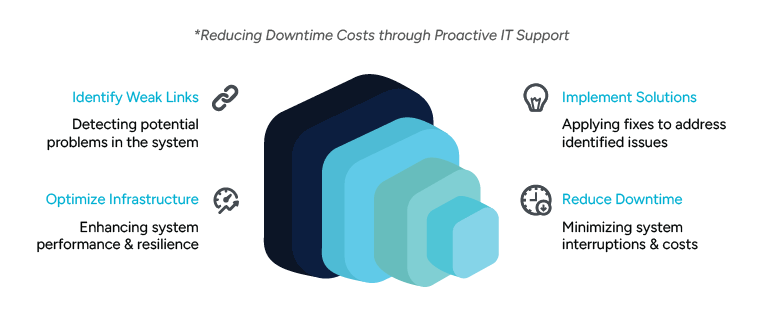
Beyond direct financial losses, frequent disruptions eat away at employee morale and customer confidence. An elite IT Support Technician doesn’t just fix problems, they implement long-term solutions that reduce the likelihood of repeat incidents. By continuously optimizing your infrastructure and proactively identifying weak links, these experts help you stay resilient even as markets fluctuate and technology advances.
An experienced IT Support Technician acts as the safety net that stops minor glitches from snowballing into major setbacks. In our hyper-connected environment, even seconds of downtime can spell costly consequences.
Stay Proactive
Stop hoping that “any IT person” can keep your organization running smoothly. Instead, invest in an elite technician who:
Identifies vulnerabilities before hackers do
Optimizes systems for maximum productivity
Communicates effectively with every department
Your competitors already know that stable, secure systems translate directly into user trust and higher revenue. So the real question is: Are you hiring a cost center, or are you investing in a strategic IT partner who keeps your entire operation humming?
Secure your systems and empower your teams with an elite IT Support Technician from LevelUp.





